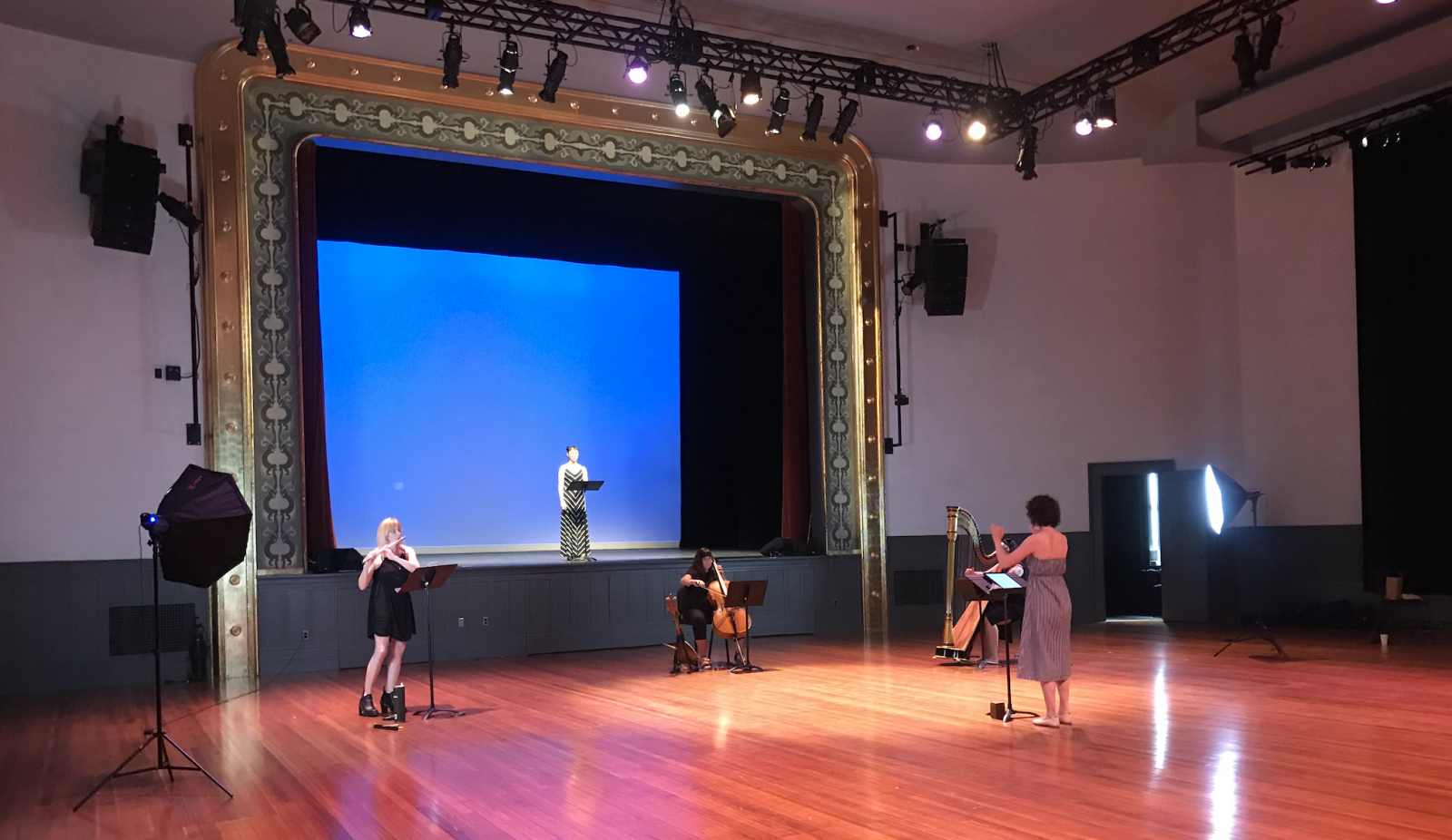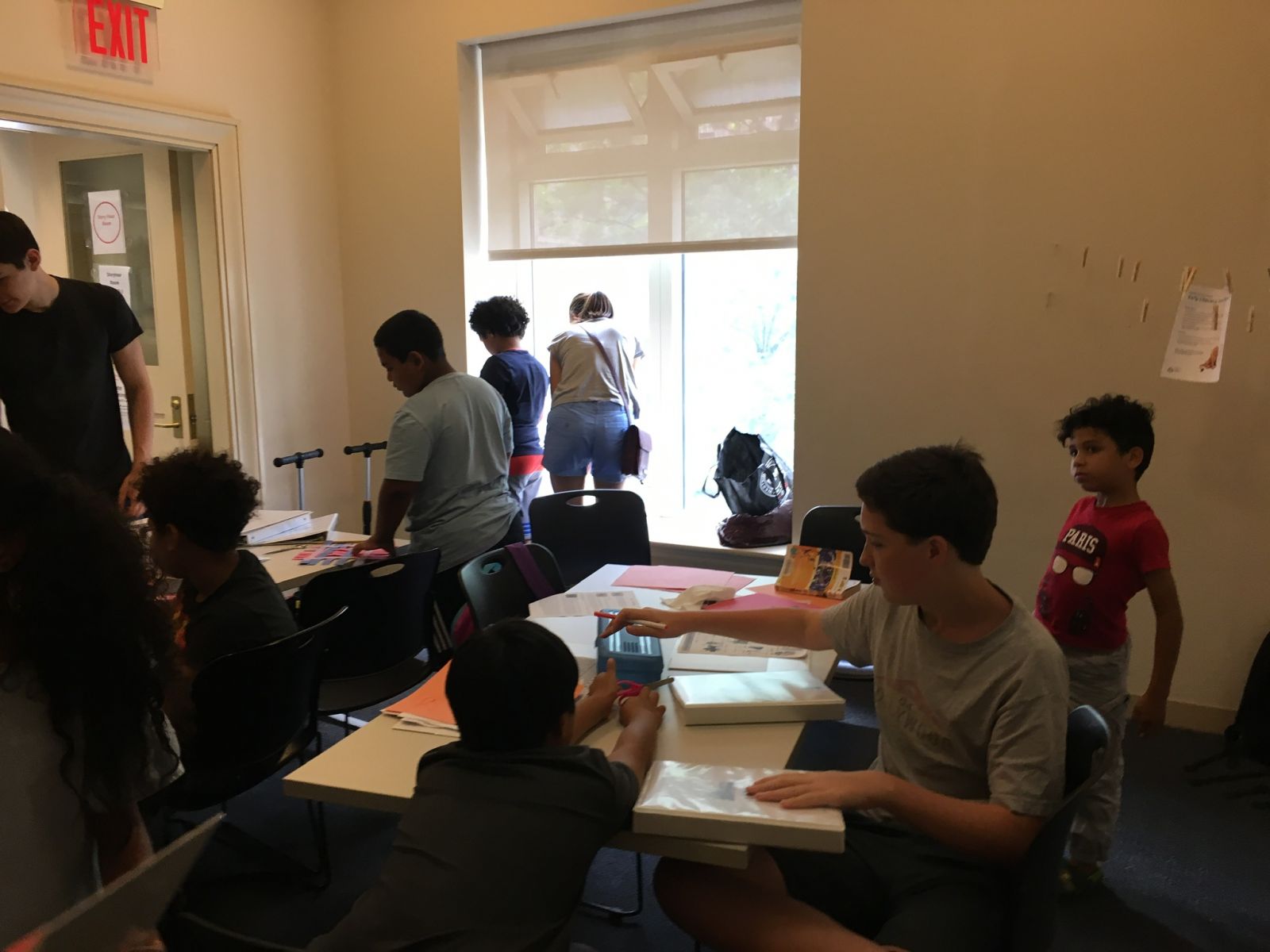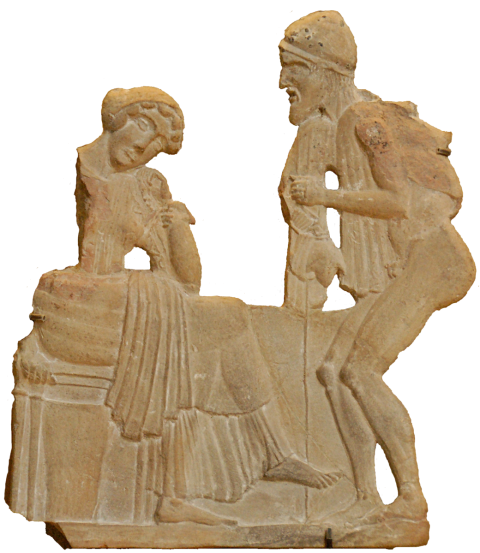The Classics Everywhere initiative, launched by the SCS in 2019, supports projects that seek to engage communities worldwide with the study of Greek and Roman antiquity in new and meaningful ways.
How can we continue to encourage engagement with the ancient world as many transition to an online existence? Three Classics Everywhere projects have found creative and innovative ways to continue their work through the obstacles the COVID-19 pandemic has produced: a feminist adaptation of the Odyssey in the form of a chamber opera; an after-school Latin program in New York City’s Morningside Heights; and the launch of a new site and social media campaign aimed to inspire passion for ancient studies.
Exploring the variant perspectives of ancient women is one way to reinvent the ways in which we engage with classical myths. Cheri Magid, Assistant Arts Professor in Dramatic Writing at New York University, collaborated with Serbian-American music composer, Milica Paranosic, to write a new feminist interpretation of the Penelope story in the Odyssey. Titled Penelope and the Geese, this piece explores faithfulness, loneliness, sexual agency, and desire. Magid and Paranosic began their collaboration during a 2018 workshop at the New Dramatists Composer-Librettist Studio in New York, where they were paired together and asked to write a song about a well-known story of their choice. The Odyssey inspired them both. Magid explains:
I had always been annoyed by the Penelope story in The Odyssey and the inequity of sexual agency between her and Odysseus. So, I suggested that in our song Penelope had actually had many lovers in Odysseus’ twenty-year-absence, and that instead of weaving the funeral shroud, she’d cut off a lock of hair from each one of her lovers and had woven them into a blanket.
Paranosic, who from a young age loved performing Serbian epic poetry, was fascinated by Magid’s idea. While composing the opera she wanted to underline “that the story [they] would be telling originated in the past, but reflected the contemporary as well.” The opera is scored with both ancient and contemporary instruments: the Greek Aulos and the Flute, the Lyre paired with the Harp, and the Serbian Gusle - a stringed instrument used to accompany Serbian epic poetry - with the Cello. These six instruments accompany seven female singers who sing the roles of Penelope, Calypso, Circe, Nausikaa, a Siren, Athena, and Aphrodite as well as several slaves.
The project gained momentum a few months later when Magid, who had formerly been the Tennessee Williams Playwright in Residence at Sewanee: The University of the South, returned to campus for a summer teaching gig. There she met Stephanie McCarter, Associate Professor of Classical Languages, who became fascinated with their project and joined in the role of consultant. Terry Papillon, Dean of the College and Professor of Classical Languages then awarded Magid and Paranosic a two-summer residency to develop Penelope at Sewanee. According to McCarter:
Penelope and the Geese invites us to consider the role of gender in how this tale has been enacted on the stage. The opera, like the Odyssey, maintains a consistent focus on the theme of fidelity, centering it not around sexual monogamy but around identity and how we share what is uniquely ours with those we love. The work builds upon tantalizing Homeric passages that invite us to speculate about Penelope and her motives, especially her dream of the geese in Book 19 and the secret of the marriage bed in Book 23.
Penelope and the Geese was supposed to have two concert performances in Mexico City in May 2020 as part of UNAM’s El Alef Festival. They have now been postponed to Spring 2021 due to COVID-19. With support from a number of grants including Classics Everywhere, Magid and Paranosic were also slated to have a staged workshop towards a full production in Saugerties, NY this August, produced by ShoutOut Saugerties. Though they could not proceed with the workshop as originally intended due to COVID-19, Magid and Paranosic found creative ways to continue their work. Earlier this August, three instrumentalists, the singer playing Penelope, and Mila Henry, conductor, joined Magid and Paranosic in Saugerties for a week of outdoor rehearsals, recording in a studio, and video shoots.

Figure 1: A socially-distanced recording in Hudson Hall, Hudson, NY, on August 15. Pictured left to right: Margaret Lancaster, flute; Hai-Ting Chinn, Penelope; Jennifer Devore, cello; Mia Theodoratus, harp; Mila Henry, conductor. Photo by Cheri Magid.
During the workshop they recorded all the instrumental parts and the part of Penelope. In the months to come, they plan to bring their six-singer chorus to Saugerties to record the rest. By the end of the process they aim to be able to broadcast a version of the entire audio that would include a visual component as well. In that way, the opera could also exist in digital format.

Figure 2: Rehearsing by a pool in Saugerties, NY. Pictured from left to right: Mia Theodoratus, harp; Lara St. John, videographer; Hai-Ting Chinn, Penelope; Jenniver Devore, cello; Margaret Lancaster, flute; Julie Edelson-Safford, photographer; Kelsey Sullivan, production assistant. Photo by Cheri Magid.
Magid and Paranosic are also working with artist Millicent Young as set designer for a live performance next year in New York. Young’s large-scale horsehair and metal sculptures evoke hair and weaving, reliquaries, and the liminal space between presence and absence—the themes of the opera.
.jpg)
Figure 3: Cheri Magid, librettist (front) and Milica Paranosic, composer (back) with horse hair sculptures by Millicent Young. Photo by Millicent Young.
Penelope and the Geese promises to bring the ancient tale of Penelope and Odysseus to diverse audiences (from New York to Mexico and even Serbia), while reframing it to generate new inspiration and meaning. McCarter explains:
Each new generation has to reinvent these old myths or they would not survive for long. Penelope and the Geese is a new telling of an old story that speaks forcefully to the moment in which we find ourselves. And it offers bold answers to questions faced by those who study Greco-Roman antiquity: Who are these stories for? And who has the right to tell them? The opera opens up the ancient tale to a diversity of viewpoints that significantly broaden its modern appeal.
.png)
Figure 4: Margaret Lancaster, flute; Hai-Ting Chinn, Penelope; Mia Theodoratus, lyre; and Jennifer Devore, Serbian gusle. Photo by Cheri Magid.
Newly launched Classics Everywhere programs are embracing not only new perspectives, but also broader audiences. Transformed by her experience taking Latin for seven years in middle school and high school, Lydia Palmer, a recent high school graduate who will be attending the University of Chicago in the spring of 2021, is organizing an after-school Latin club program for about 50-60 students in elementary and middle school. Although the program was originally designed as an in-person summer camp in Morningside Heights in New York City, due to the pandemic, it will now run as a virtual after-school program for students aimed at students from a wider and more diverse background. The program will run for 10 weeks starting in mid-September. While almost half of the program’s initially enrolled students will be from the Sisulu-Walker Charter School of Harlem and the Mott Hall II School in West Harlem, enrollment will be open to any interested student.
The program will be free and conducted via Zoom. SCS funding is helping with the creation of a website and with purchasing Zoom Premium to provide a better pedagogical experience for the students. Palmer is also recruiting volunteers to help supervise students working collaboratively in Zoom break-out rooms – if you are interested in helping, find out more here.
Palmer’s program aims to make Latin exciting and inspiring for young students from variant linguistic backgrounds and help build strong and confident speakers and writers. Her Latin program will focus on vocabulary and grammar to improve oral and written communication skills, while also including many games and visual components so that Latin becomes enjoyable and fun.
Having grown up in Morningside Heights and seeing groups of people from numerous backgrounds in her neighborhood, Palmer is especially interested in reaching students from disadvantaged upbringings:
My goal in leading this program is to instill in students a basic understanding of Latin grammar and Roman culture, as well as to promote greater socioeconomic and racial diversity among young Latin learners. The program provides Latin instruction to communities to whom it has historically been unavailable, thereby helping to amend prolonged disparities in access to classical education.

Figure 5: Students at Morningside Heights Public Library during Lydia Palmer’s in-person Latin program last summer. Photo by Lydia Palmer.
A group of Ancient World scholars led by David Danzig, PhD Candidate at ISAW at NYU, has created Save Ancient Studies in America (SASA). Joining the many US-based efforts to preserve and promote the study of the ancient world, this new non-profit organization arranges reading groups focused on classical texts and other special events for the general public. SASA’s states that its main mission is to inspire a passion for antiquity:
[We endeavor] to promote interest in the ancient world and guide it toward Ancient Studies, broadly defined, particularly for middle school, high school, and undergraduate students. By inspiring teenage learners to gain a fascination for or develop their interests in the ancient world, SASA aims to boost undergraduate and graduate enrollment in Ancient Studies fields.
With support from Classics Everywhere, SASA is starting a Social Media Campaign called Inspire. Inspire, which launches September 1, 2020 is an ambitious attempt to achieve a society-wide impact on learners all ages. According to SASA’s organizers, “the goal of the project is to reach 100,000 social media engagements over the course of a year.” To achieve this goal SASA will publish one post related to the ancient world on Twitter, Instagram, and Facebook every single day for an entire year. Paid marketing boosts will also be applied strategically over the course of the year to draw in a wide audience. As a result of this social media campaign, SASA hopes to attract donations to establish paid internships for the future.
SASA’s social media posts will be divided into the following 8 categories:
1) Modern World, Ancient Roots, offering fun stories about words’ etymologies 2) What’s that Artifact, which will introduce audiences to a curious object from the ancient world
3) Ancient FanFiction, which will provide fictional narratives of ancient objects or events
4) D&D&D (Deities, Demons, and Demigods), which will offer stories or fun facts about an interesting being
5) Ancient Kitchen, which will give recipes inspired by the ancient world
6) Scholars and Students of the Ancient World, where Ancient World scholars of all levels will discuss their experience with and interest in Classical Antiquity and the ancient past
7) Ancient and Me, which will include personal reflections and stories about individual experiences and personal connections with the ancient world
8) Pop Culture, which will discuss anything in our pop culture – past or current – that is related to or inspired by the ancient world. Certain weeks will be occupied with a particular theme, and some posts will be structured around current events. In addition, SASA plans to organize virtual special events like movie nights or book clubs.
SASA’s volunteer staff and their 12 volunteer interns spent the summer creating most of the posts for the campaign and have pre-loaded them in a Social Media Scheduler app so that they can easily upload on a daily basis starting in September. Their interns have also been mindful of developing culturally-aware content to attract a broad audience, including communities of color and other students historically marginalized in higher education and Ancient Studies. Pinar Durgun, SASA’s Social Media Campaign coordinator, and an archaeology post-doc at the Metropolitan Museum of Art, shares her take on the project:
SASA is composed of hard-working volunteers who are students and scholars of the ancient world. We all dedicate our time to these projects, because we want to enable anyone interested in the ancient world to have access to fun, accurate, and informative content about the ancient world.
These projects demonstrate that the creativity and outreach work within the field of Classics has hardly slowed in the face of a global pandemic; it has even flowered. Whether through the launching of a feminist opera, through virtual programming for language pedagogy, or via social media campaigns, these Classics Everywhere grant awardees are taking advantage of our new virtual reality. They join so many others in rethinking the possibilities within and outside our field by redrawing its boundaries.
Header Image: Odysseus, disguised as a beggar, approaches Penelope, Terra Cotta, 450 BCE, Now at the Louvre (CC-SA 4.0).


